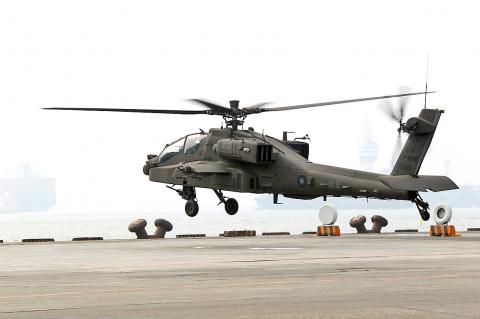Senior Ministry of National Defense officials and other experts said enhanced cooperation arising from the formation of military “sister units” between Taiwan and the US could help counter a possible marine blockade and attack by China’s People’s Liberation Army.
Taiwan’s Aviation Special Forces 601st Brigade, based in Taoyuan, has formed a sister-unit relationship with the Hawaii-based US Army 25th Combat Aviation Brigade, according to a report by the Liberty Times (the sister newspaper of the Taipei Times).
The 25th is a unit of the US 25th Infantry Division of the US Pacific Command, headquartered in Hawaii for military operations in the Asia-Pacific region.

Photo courtesy of the Army Command Headquarters
The Psychological Warfare Battalion Headquarters of the ministry’s Political Warfare Brigade has also formed a sister-unit relationship with the US 7th Psychological Operations Group, which is also part of the US Pacific Command, the report said.
A senior military official was quoted in the report as saying that the US initiated the two military cooperation programs.
The arrangement was made partially because Taiwan’s 601st Brigade was modeled on US Army combat aviation units, using Apache AH-64 attack helicopters, OH-58D Kiowa reconnaissance helicopters and Black Hawk UH-60 utility helicopters, the report said.
Ministry Administrative Deputy Minister Lieutenant General Wang Shin-lung (王信龍) on Wednesday confirmed the development when he responded to questions at a meeting of the Foreign Affairs and National Defense Committee at the legislature in Taipei.
Forming sister units has both symbolic and practical meaning, Wang said.
He did not provide details on the scope of the collaboration.
Ministry spokesperson Major General David Lo (羅紹和) also confirmed the developments, saying: “The defense ministry welcomes the arrangement, since these exchanges can boost the capability of our armed forces.”
He also declined to elaborate on details of the collaborations.
DPP Legislator Tsai Huang-liang (蔡煌瑯) and defense experts said the development communicated a clear political message of an improving relationship between Taiwan and the US, while warning China against any military intentions in the Asia-Pacific region.
“Although the Ministry of National Defense would talk only about the ‘military exchange’ aspect, it is in effect the US’ way of including Taiwan in its military alliance in the region,” Tsai said yesterday. “We see that the US is implementing its strategy with a pivot toward the Asia-Pacific region and US forces are returning to this part of the world in a big way. So this is a very crucial time and Taiwanese must seize this opportunity to enter into a military alliance with US.”
Tsai said it also shows that Washington understands Taiwan’s important and strategic position in the face of China’s growing military strength and potential conflicts over disputed territorial claims.

The Taiwanese passport ranked 33rd in a global listing of passports by convenience this month, rising three places from last month’s ranking, but matching its position in January last year. The Henley Passport Index, an international ranking of passports by the number of designations its holder can travel to without a visa, showed that the Taiwan passport enables holders to travel to 139 countries and territories without a visa. Singapore’s passport was ranked the most powerful with visa-free access to 192 destinations out of 227, according to the index published on Tuesday by UK-based migration investment consultancy firm Henley and Partners. Japan’s and

NATIONAL SECURITY THREAT: An official said that Guan Guan’s comments had gone beyond the threshold of free speech, as she advocated for the destruction of the ROC China-born media influencer Guan Guan’s (關關) residency permit has been revoked for repeatedly posting pro-China content that threatens national security, the National Immigration Agency said yesterday. Guan Guan has said many controversial things in her videos posted to Douyin (抖音), including “the red flag will soon be painted all over Taiwan” and “Taiwan is an inseparable part of China,” while expressing hope for expedited “reunification.” The agency received multiple reports alleging that Guan Guan had advocated for armed reunification last year. After investigating, the agency last month issued a notice requiring her to appear and account for her actions. Guan Guan appeared as required,

Japan and the Philippines yesterday signed a defense pact that would allow the tax-free provision of ammunition, fuel, food and other necessities when their forces stage joint training to boost deterrence against China’s growing aggression in the region and to bolster their preparation for natural disasters. Japan has faced increasing political, trade and security tensions with China, which was angered by Japanese Prime Minister Sanae Takaichi’s remark that a Chinese attack on Taiwan would be a survival-threatening situation for Japan, triggering a military response. Japan and the Philippines have also had separate territorial conflicts with Beijing in the East and South China

A strong cold air mass is expected to arrive tonight, bringing a change in weather and a drop in temperature, the Central Weather Administration (CWA) said. The coldest time would be early on Thursday morning, with temperatures in some areas dipping as low as 8°C, it said. Daytime highs yesterday were 22°C to 24°C in northern and eastern Taiwan, and about 25°C to 28°C in the central and southern regions, it said. However, nighttime lows would dip to about 15°C to 16°C in central and northern Taiwan as well as the northeast, and 17°C to 19°C elsewhere, it said. Tropical Storm Nokaen, currently